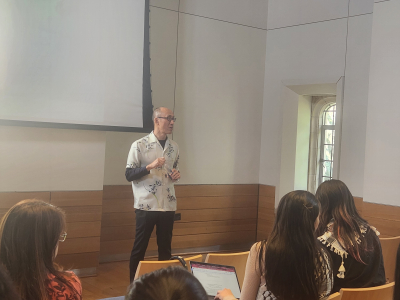Racial Rage, Racial Guilt: The Uses of Anger in Asian America

On April 11th, 2024, David Eng presented a talk titled “Racial Rage, Racial Guilt: The Uses of Anger in Asian America” at Duke University. David Eng is the Richard L. Fisher Professor of English and the Faculty Director of the Program in Asian American Studies at University of Pennsylvania. By examining the Netflix-series Beef, Eng boldly asked the audience to consider emotions (anger, ego, resentment, etc) as part of an Asian American structural position and itself as the energy necessary for social change.
Beef follows the working class Korean-American handyman David and an affluent Chinese-American entrepreneur, Amy, as they embark on what Eng called, “a single-minded quest on who might wreak more havoc on the other.”
Drawing on his interpretation of Beef and his experience working with Asian American patients in mental health facilities, Eng asked, “How can we trace the anger that results from such racialization as 1) part of the socialization/structural positions of Asian Americans and 2) as being informed by the “middle man” like position Chinese coolie laborers occupied in the Americas at the end of the institution of slavery.”
“We all express rage, but [have] few outlets and few processes,” Eng stated at his talk. To illuminate the racialization in this rage, Eng put into conversation Steven Yeun’s New York Times Interview with Audre Lorde’s “The Uses of Anger: Women Responding to Racism.”
In the interview, Yeun ponders about the Asian American experience that underscores Beef: “It’s like when you’re thinking about everyone else, but nobody else is thinking about you,” Yeun says. In her essay, Lorde discusses how anger in response to racism figured in her life, “I have lived with that anger, ignoring it, feeding upon it, learning to use it before it laid my visions to waste, for most of my life. Once I did it in silence, afraid of the weight. My fear of anger taught me nothing.”
Eng used Yeun’s quote to interrogate the supposed inscrutability of the Asian American figure, obscured by the dominant black/white paradigm of race. This stereotype of inscrutability produces non-cathartic expressions that lead to cognitive dissonance and psychic dissolution, as seen in Beef which ends in tragedy for both characters.
With this invitation, Eng hoped “to chart new grounds about how rage can be transformed into a collective anger, not ignoring it or feeling upon it, but using it like Lorde.”
Drawing upon his experience as a therapist for Asian American patients, Eng suggested how a collective healing process could begin. Therapists can get “beside” their patients, establishing a horizontal relationship built on trust, mutual care, and vulnerability. This new orientation can allow for the anger, the rage, the sadness, the despair to not only be felt but also shared collectively by the community.
Just like the two characters in Beef overcome their own personal and interpersonal conflict through this trust – what Eng calls mind-melding and becoming each other – Asian Americans can heal together as a community by empathizing with each other.
This collective care can help Asian Americans acknowledge, articulate, and get “beside” the racialized trauma they feel particularly as Asian Americans and in turn, transform the anger and the erotic into sources of power necessary for social change.
“In so doing, [they] transmute self-destruction, converting it into an external will for social change,” Eng says, just like how Lorde concluded her iconic article “The Uses of Anger: Women Responding to Racism.”
After the talk, attendees asked about Eng’s theoretical framework and how it can be applied to second-generation Asian Americans. Others asked how the real-life examples from Asian American mental health settings can translate to spaces in which Asian/Americans are intentionally centered, like student groups.
Overall, the event was exciting, engaging, and interactive. Eng had professors act out Beef scenes, hilariously transforming the typically dry academic setting of the event to an informal, lively and communal discussion. “You all should stick to your day jobs,” Eng jabbed as professors/actors began/concluded their acting debut.
